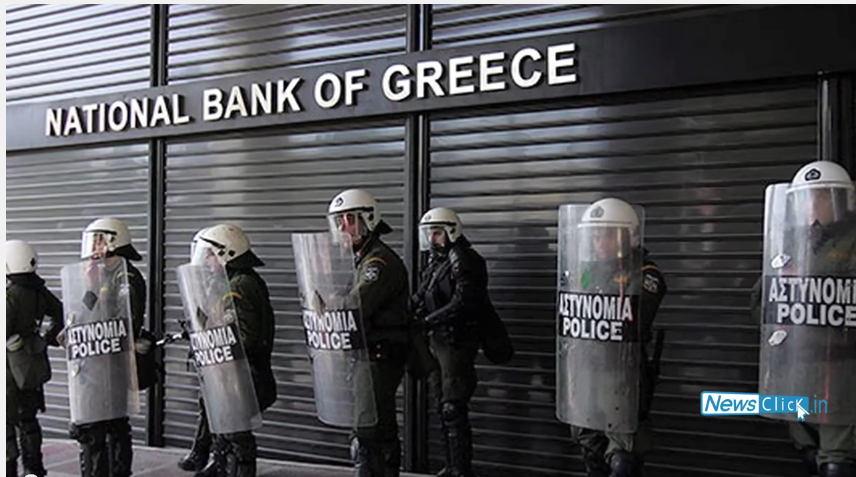Greek “Bailout” Will Make the Crisis Worse: Rajat Nag
Newsclick interviewed Rajat Nag, former Managing Director General of the Asian Development Bank, on the Greek crisis. Rajat Nag compares the “solution” offered by the the troika – the European Central Bank (ECB), the IMF and the European Commission -- to a doctor telling a patient with blocked arteries to change his lifestyle and diet, when he needs an immediate angioplasty. After the 2008 economic crisis, Greece's economy tanked. What Greece urgently needs for its economy to expand; the Troika's prescriptions will only contract it further. Contrary to popular perceptions, Greece's tax collection is almost twice that of Germany's – it is 22.4 % as against 11.5%. While Greece needs to change some of its policies and carry out certain reforms, the “solutions” offered by the troika will only compound its current problems. This will lead to a repetition of the crisis and further bail-outs down the road. Finally, it is imperative to work out a global solution to problems of debt restructuring and debt relief for countries.

Prabir Purkayastha - Hello and welcome to Newsclick. Today we have with us Rajath Nag, former Managing Director General of ADB and will discuss with him as a Banker, how does he look at the Greek Crisis and what is happening now.
Rajat, The Eurozone crisis, of course the Greek crisis as it word has been in the news for quite some time. The basic issue is how do as a Banker, do you look at what the banking institutions are doing to Greece? Because it does appear that it is really the bankers who are setting what Greece should or shouldn't do and the politicians in European Union seems to be baking on the bankers are doing. So how do you look at this issue?
Rajat M. Nag - I think that is not an unfair statement at all Prabir but perhaps you can step back a bit and I think the genesis of this Greek crisis is really Greece joining EU to begin with. If you look back at 2001, there really wasn't any particular need for Greece to join. But for the sake of European unity, in the fury of the moment Greece joined but it wasn't ready. Quite frankly they forge the books aided and abetted by some Wall Street investment bankers.
Prabir - Goldman Sachs has known to have done that and what you are dragging that who today is the chief of ECB was one of the key figures in that.
Rajat - Right, so what happened was you joined a club, aided and debited by others and then you basically found that you really didn't have to do ways to pay for the membership as it where. So for the next 7 years, 2001-2008, Greece basically borrowed its way to prosperity and borrowed from whom? Private Bankers; German, of course some Americans, other Europeans and some private Greek bankers. So basically the party went on by borrowing money, and then came the financial crisis of 2008. Thats when the chicken came home to loose. By 2010, basically Greece had a debt of roughly about 130% of GDP, which is high but not totally out landed. What their problem was that their fiscal deficit was about 15% of GDP. That is the one sort of you know and the debt was growing around 12% per year. So suddenly Greece found itself not being able to serve its debt. Now at that point, of course Island at 2020, at that point I think the Greek govt should have set " OK it is a problem. it is a private debt, you sort it out, you take the haircut, Greece will have to bare some of the brand ". But the Troika - ECB, EU and IMF- basically then came on the first bail out and I think that was the beginning of the Greek crisis.
Prabir - Two questions here of course. We will deal with them one on the one. One is the bail out you said, where the private debts were really nationalised as it work so the sovereign govt took over their bank's debt. This is the one part of it which you have identified. The other problem of course is the sustainability of the debt but before you come to that, if you look at the 2008 crisis, which is what triggers all these, Spain didn't have the problems of the Greek's state. But Spain is not in a very different situation. So does seem that the debt on the Greek parting is only one part of the problem. There is a bigger problem of Euro zone, of different kinds of economies and the fact that the Germans who are suppose to be the good guys, actually there is a huge surplus in their external trade account. So this is also part of the Eurozone larger project.
Rajat - You are absolutely right and I will come to that in a moment. 19 countries, it is not United States of Europe. It is European Union but 19 countries have to get-together, sort of synchronise the physical policies which is never done.
Prabir - It is an economic union, it is not a political union.
Rajat - So the Greeks I think got into trouble by joining a party they need not have and couldn't afford and they kept borrowing. And the first bail out, then the second bail out and you rightly said most of the money was really to pay off the previous debt.
Prabir - Back the argument is 90% of the fund which has been given to them post 2010 have been into pay back, basically the banks. So essentially what is happening is money is coming from a source and going back to the same source.
Rajat - But if it was just a neutral which it wasn't, it would have been still OK I suppose but the worst was, for return that money Greek set to undertake some fairly severe austerity measures. Now there is certainly wars ease profligacy, certainly is reason to able to increase your tax revenue, etc but the fundamental mistake was thinking that if you just tighten your belt enough and cut down the expenditures, you will be able to sort of save yourself to prosperity. Previously you are consuming yourself to prosperity, now it is a question of somehow being austere and safe. The trouble was the Greek economy tanked 25% of the last 4 years, 2010-2014. In 2014, for the first time, they saw a certain very slight 0.8% growth but previously years, consistently very significant contractions. So what happens? If you have contractions, you don't have people's income. If you don't have income then what do you track? So the multiplied effect of expenditure reduction and the tax points both worked in the wrong way. If you wanted the Greeks to be able to pay back all these debts, what you should do really in a Kendrian sense, you want economy to grow and then you collect more taxes. But here there is other way around so it basically went to a tail spin and you know I was mentioning to you earlier that the Greek tax collection isn't bad. A 22% of GDP which is considerably higher than Germany which is 11, you know other countries around that low teens. So it is not that the Greek on collecting, it is that they collecting of much a smaller pot. The GDP has shrunk only by 25% and also the fiscal deficit is obviously high, being vanished and that is where I think Greek has to look at the public services.
Prabir - But Rajat, in 4 years or 5 years they have brought the fiscal deficit from 15% to 1% surplus, which is again a very remarkable achievement if you take it whole
Rajat - But if you see that is essentially, unfortunately a very sort of mechanical accounting approach --- All these you keep shrinking expenditure somewhere your surplus or deficit will go down. But what is happening in the real economy is, as you know, is very very severe unemployment and the incidents of those cuts is disproportionate, is the public services we suffer, the health, education, unemployment, whatever. Now the third bailout which is now been sort of agreed, I am afraid it is basically continue the same prescription. If you look at the condition for the third sort of bailout, is again fairly Draconian. You reduce expenditure, you make the pension reforms, you increase the VAT. Now all of those I think are necessary and indeed desirable but it is a question of sequencing. You have got a patient on the operating table, you don't lecture the patient on now you got to reduce weight, you got to give up smoking and you got to sign on the dotted line. You first get the patient on his feet. My feeling is that the Greeks rejected this whole packages and referendum last month but then again have come back to the table because they don't have any choice, have to come to grips with this very severe crisis of austerity which will actually make things worse. What they need now is some sort of economical revival.
Prabir - This is where the banker issue really comes in. Do you think instead of an economist approach and all the leading economist of the world seems to have said, this is not sustainable. The IMF chief economist have said this is not sustainable that unless you have really a reduction of the debt burden on Greece, you cannot revive the Greek economy and they will not be payback for 50 years. This is--- we are not particularly kind to these things in the past. Given all these, do you think that what I call the Bankers' approach or what is the Monetary approach or what Paul Krugman calls as the Austerian approach. Is really core of the problem today?
Rajat - You know the evidence is clear, it hasn't worked. I don't know which school I belong to but I just think I belong to real school. You try a prescription which is what they did it in 2010 and as I said high side 2020 but at that time as looking at some figures, IMF has projected that the economy will obviously deteriorate a bit but then it will move up again. So the curve was updish. What has actually happened is straight line declined. It is only in the last year it ticked up a bit. So and just a bit and again hopes springs eternal so now people are talking about in 2015, it will grow by slightly under 1%, in 2016 around 2%. I don't really quite frankly see how that will happen unless you really start to not force austerity but you force growth. But Prabir, this another thing here, which is the large amount of the sovereign debt that Greece has as about 340 Billion Euros, 80% of that is held by other EU countries, principally Germany. Unless we as an international community start talking about debt relief, this problem won't go away because out of entire amount the third bail out, only about 50 Billion dollars is really being put forth sort of new investments and that too they put that 50 Billion dollars as what is beingcalled as it trust fund, which basically means Greece will have to sell its assets; airports, aircrafts or whatever infrastructure and create a 50 Billion dollar pool to boost investment but a bulk of the money as you said is going to pay the debts, previous debts, the principal and interest. So I think somewhere along the line, the international community, particularly Europe will have to say " Look, we can't walk away the responsibility that we all probably created, some of it, not all of it, the problem. Now we are going to be part of this solution." This business of thrusting down austerity conditions, you know remove subsides, which by itself as it is desirable but you got to look at the subsides, increase taxes, but tax whom? I mean they have to have income.
Prabir - This is the interesting point you raised that, who is responsible for having admitted Greece to the club? Argument is Greece didby its way in. But actually the EU pulled way of furging their way in. So they have also to carry the responsibility and you also talk about the European union as a whole or the EU's, Euro zone as a whole taking the responsibility. This is the problem with Maastricht Treaty. You have an economic union but no political union and therefore the Greeks can go to hell as far as the German people are concerned, can be a consequence of this approach?
Rajat - I think that is very good point on something that I think we all not just sort of people in Europe need to concern yourself with because, just again stepping back for a moment. After the German re-unification in 90s and the Eastern European countries coming into EU, one big difference with Greece is the following. They East Germany obviously but also the EU, the Eastern European countries were part of a German supply chain. So if you could get the wages right, if you could make the; there are various countries more productive. If could make more competitive, they would benefit becoming part of the German supply chain. Greece is not part of the German supply chain. Greece exports only about 25% of it's output. So Greece is in a very different situation. I think Greece need to get it's wages more inline with productivity. Greece I think need to look at pension reforms, Greece need to become more competitive. But what worked for Eastern Europe will not work for Greece. I think this is something one need to recognise. One example, as part of the third bailout, the condition has been that you cannot give VAT exemption to the outer alliance of Greece. At a macro level it is understandable but one of the reason for the VAT exemption in the outer alliance is to encourage tourism which is what Greece has. So now what you are doing is, you might end up actually affecting the very industry, may be the only industry which is actually very viable. So my point is that macro economic measures have to be very context specific and in Greece's case, I am afraid that it hasn't been so far and therefore going back to the main point you are making which I totally agree with that if EU is a concept is not just economics, it is a concept then I think the shared burden concept must also be borne in mind.
Prabir - Last question. Do you think there is, therefore a loss of confidence in the Eurozone and it will affect Euro as a currency, other countries will be much more hesitant, countries which are inside, this issues will continue to raise? Do you think actually the Eurozone leadership has done well by the Eurozone doing what it is done, which is really converted Greece into a virtually protectorate of the European Bankers. Thats what the way it looks to be, including the 50 Billion trust fund which you are talking about, which is reallygaraxial of Greece's assets, thats what it really is at the moment.
Rajat - Incidentally, there was a demand at one time. That trust fund we housed in Luxembourg, not Athens but fortunately at least still in Athens.
Pabir - Symbolically at least in Athens.
Rajat - Right. You raised a very important question Prabir. I have to say that I am a great believer in regional cooperation and integration. And Europe of course has shown the way. What perhaps has happened is that, they moved on this integration process a bit too soon and a bit too fast. Because you also have to; when you admit people to the club, you also got to make sure that they are ready for it and Greece is certainly was not, had that happen, I think it will be a disaster if then it has to break-up because the consequences for Greece of a debt set also going to be very severe and all we are seen the consequences of the banking industry. So therefore my feeling is that the Eurozone will survive but I think the Euro leaders sooner later than recognise that these countries are not equal and not all capable. But having taking them into family, they will have to share the burden.
Prabir - It is with the pleasure talking to you, will come back to you more on these issues as it develops. Thank you very much.
Rajat - Thank you.
DISCLAIMER: Please note that transcripts for Newsclick are typed from a recording of the program. Newsclick cannot guarantee their complete accuracy.
Get the latest reports & analysis with people's perspective on Protests, movements & deep analytical videos, discussions of the current affairs in your Telegram app. Subscribe to NewsClick's Telegram channel & get Real-Time updates on stories, as they get published on our website.
























